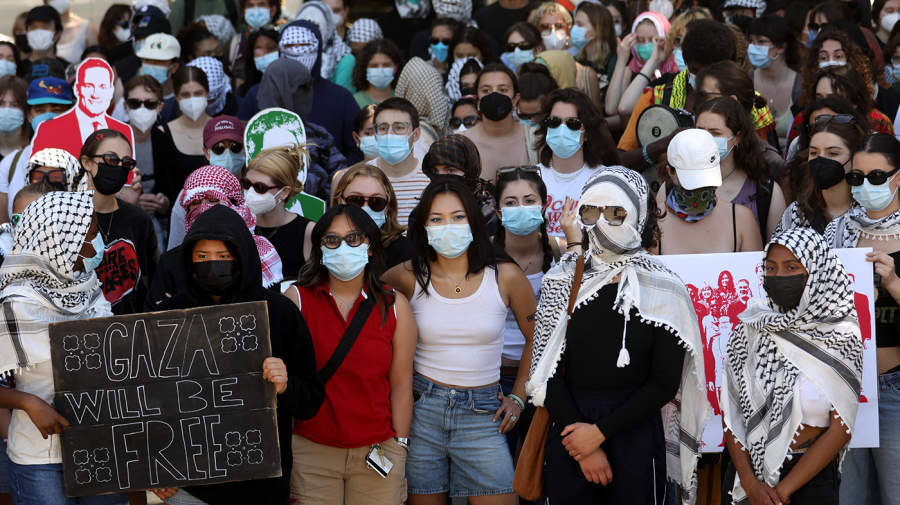
College students demonstrating their support for Palestinians on campuses across the country are shaking up the political debate on Capitol Hill, pitting Israel’s closest allies in both parties against more liberal Democrats siding with the protesters in accusing the country of orchestrating a genocide in Gaza.
The battle has emerged as a major election-year challenge for President Biden, who is attempting a tricky balancing act between demonstrating strong support for Washington’s closest Middle Eastern ally, particularly in the wake of Hamas’s October terrorist attacks, while simultaneously condemning Israeli Prime Minister Benjamin Netanyahu for doing too little to protect civilian lives in Gaza.
Those tensions were on display in the Capitol earlier this month during the debate over providing new military aid to Israel — legislation opposed by more than three dozen House Democrats in opposition to Netanyahu’s wartime tactics and wary of being “complicit” as the civilian casualties in Gaza mount.
And they’ve stayed at the forefront even after Congress passed and Biden signed the aid bill, as liberals join the pro-Palestinian demonstrations at universities around the country, their pro-Israel colleagues visit campuses to protest the protesters, and Republicans seize on the issue in an effort to make the long-running Israel-Palestine conflict a campaign issue heading into November’s elections.
Speaker Mike Johnson (R-La.) on Wednesday visited Columbia University, the site of one of the country’s most controversial pro-Palestinian sit-ins, to denounce the protesters and call on the school’s president, Minouche Shafik, to resign “if she cannot immediately bring order to this chaos.”
“As Speaker of the House, I am committing today that the Congress will not be silent as Jewish students are expected to run for their lives and stay home from their classes hiding in fear,” Johnson said.
Johnson is not the first congressional lawmaker to make an appearance on the Manhattan campus amid the protests, trips that are creating a split-screen lawmaker response to the explosive demonstrations.
On Monday, a band of Jewish Democrats — Reps. Josh Gottheimer (N.J.), Kathy Manning (N.C.), Jared Moskowitz (Fla.) and Dan Goldman (N.Y.) — walked through Columbia’s campus and held a press conference calling on university administration to take strong action protecting Jewish students and condemning antisemitism.
That same day, New York Republican Reps. Mike Lawler and Anthony D’Esposito held their own media availability on campus to deliver the same message. Both lawmakers appeared alongside Johnson at Columbia on Wednesday, and they had joined other New York Republicans on a letter earlier in the week condemning the demonstrations and calling for Shafik to step down.
“The ongoing situation that has unfolded,” the lawmakers wrote, “is a direct symptom of your continued lax enforcement of policy and clear double standards.”
Rep. Ritchie Torres, a New York Democrat, has joined those calls, framing the tense situation as a public safety threat.
“If you cannot ensure the safety of your students, then you have no business serving as President of any university, let alone the alma mater of Alexander Hamilton,” Torres said in a statement.
Those voices are being challenged, however, by liberal lawmakers — and fierce critics of the Netanyahu administration — who are accusing Israel of conducting an indiscriminate military operation in Gaza, which has led to the death of more than 34,000 people in a region where more than half the population is under the age of 18.
On Tuesday, Rep. Ilhan Omar (D-Minn.), one of just three Muslim lawmakers in Congress, addressed pro-Palestinian demonstrators at the University of Minnesota, encouraging them with the message that they’re on the right side of history.
“Follow your gut and know that what we are doing, the voices that we are raising to save lives in Gaza, is a just and righteous and morally correct,” Omar, whose daughter was arrested last week at the Columbia University protest, told the crowd.
“We recognize Israel’s right to protect itself. We reject the policy and the practice of Netanyahu. Terrible,” former House Speaker Nancy Pelosi (D-Calif.) said in an interview with RTÉ’s Six One News during a visit to Ireland. “What could be worse than what he has done in response?”
In one exchange that seemed to encapsulate the tensions among Democrats, Moskowitz responded to an online post from Sen. Bernie Sanders (I-Vt.) explaining his “no” vote on providing aid to Israel.
“Bernie, now do AntiSemitism. Why so quiet?” Moskowitz wrote.
Rep. Alexandria Ocasio-Cortez (D-N.Y.) responded, “Sen. Sanders’ family was killed in the Holocaust. He dedicates his every moment to realizing tikkun olam. His commitment to protecting innocents in Gaza stems FROM his Jewish values. He and many other Jewish leaders deserve better than to be treated this way. This is shameful.”
Caught in the middle of the debate is Biden, a former head of the Senate Foreign Relations Committee and close Israel ally who also has a fraught relationship with the conservative Netanyahu, who is fervently opposed to the idea at the very center of the Biden administration’s proposed peace deal: the creation of a sovereign Palestinian state.
Biden is also seeking a second term in the White House in November and is scrambling to shore up support in the Muslim American community, which has an outsized influence in swing states like Michigan that could be crucial to the president’s reelection chances.
Activists in key swing states have urged primary voters to mark “uncommitted” as a way to protest Biden’s Israel policy. In Michigan, “uncommitted” secured two delegates and in Minnesota it earned 19 percent of the vote.
Walking that delicate line, Biden this week addressed the college demonstrations with a message containing something for both sides of the fiery debate.
“I condemn the antisemitic protests,” Biden said Monday during a public event in Virginia. “I also condemn those who don’t understand what’s going on with the Palestinians.”
Copyright 2024 Nexstar Media Inc. All rights reserved. This material may not be published, broadcast, rewritten, or redistributed.














